补充硫胺素可调节热应激条件下泌乳胡母羊的瘤胃微生物群并部分恢复其泌乳性能
IF 2.5
2区 农林科学
Q1 AGRICULTURE, DAIRY & ANIMAL SCIENCE
引用次数: 0
摘要
本研究旨在探讨在热应激条件下,日粮补充硫胺素对胡氏母羊产奶量、瘤胃微生物群谱和炎症反应的影响。研究使用了 27 只多胎妊娠和哺乳期胡母羊,体重为 71.6 ± 1.4 千克,妊娠日龄为 11 ± 0.5 个月,产奶天数为 31 ± 1 天,产奶量为 1.68 ± 0.15 升/天,日干物质摄入量为 2.14 ± 0.12 千克。经过 7 天的适应期后,母羊被分成 3 组,每组 9 只(每栏一只胡母羊),采用完全随机设计,并被分配到三种环境温度条件中的一种,持续 15 天:不补充硫胺素的恒温组(CON)、不补充硫胺素的热应激组(HS)或补充日粮硫胺素(200 毫克/千克 DMI;HST)的热应激组。结果表明,与 CON 组相比,HS 组的牛奶蛋白质、脂肪和乳糖含量在第 10-15 天明显下降(P < 0.05)。相比之下,与 HS 组相比,补充硫胺素可显著提高第 13-15 天的牛奶蛋白质含量,提高第 14 和 15 天的牛奶脂肪和乳糖含量(P < 0.05),从而在一定程度上提高牛奶质量。此外,与 HS 组相比,补充硫胺素(HST 组)可显著提高循环中硫胺素和免疫球蛋白 A(IgA)的浓度,同时显著降低 LPS 结合蛋白、白细胞介素-1(IL-1)和血清淀粉样蛋白 A(SAA)的水平(P < 0.05)。瘤胃微生物组成分析表明,补充硫胺素可增加酪杆菌、丁弧菌、乳酸菌和酵母菌的丰度。总之,胡氏母羊泌乳期受热会降低牛奶产量和质量,影响瘤胃微生物。在热应激条件下,膳食中补充硫胺素可改善瘤胃发酵,减轻热应激引起的炎症,并恢复胡氏母羊的产奶量。本文章由计算机程序翻译,如有差异,请以英文原文为准。
Dietary thiamine supplementation modulates ruminal microbiota and partly restores lactation performance in lactating Hu ewes under heat-stress conditions
This study aimed to investigate the impact of dietary thiamine supplementation on milk production, rumen microbiota profile and inflammatory response of Hu ewes under heat-stress conditions. Twenty-seven multiparous pregnant and lactating Hu ewes of 71.6 ± 1.4 kg body weight, 11 ± 0.5 months gestation age, 31 ± 1 days in milk, 1.68 ± 0.15 L/d milk yield, and 2.14 ± 0.12 kg of daily dry matter intake (DMI), were used in the study. Following an acclimation period of 7 days, ewes were divided into 3 blocks of 9 each (one Hu ewe per pen), in a complete randomized design and assigned to one of three environmental temperature conditions for 15 days: thermoneutrality without supplementation (CON), heat-stressed without supplementation (HS) or heat-stressed with dietary thiamine supplementation (200 mg/kg of DMI; HST). The results indicated that the HS group experienced notable declines in milk protein, fat, and lactose content from day 10–15 (P < 0.05) compared to the CON group. In contrast, thiamine supplementation significantly elevated milk protein content from day 13–15 and raised milk fat and lactose content on days 14 and 15 (P < 0.05) compared to the HS group, thereby enhancing milk quality to a certain extent. Additionally, thiamine supplementation (HST group) significantly increased the circulating thiamine and Immunoglobulin A (IgA) concentrations accompanied by a significant decline in LPS-binding protein, interleukin-1 (IL-1), and serum amyloid A protein (SAA) levels compared to the HS group (P < 0.05). Rumen microbial composition analysis revealed that thiamine supplementation increased the abundance of Pyramidobacter, Butyrivibrio, Bacteroides, and Saccharofermentans. In conclusion, heat exposure during lactation in Hu ewes lowered milk production and quality, affecting rumen microbes. Dietary thiamine supplementation could improve rumen fermentation, mitigate heat stress-induced inflammation, and restore milk production in Hu ewes under heat stress conditions.
求助全文
通过发布文献求助,成功后即可免费获取论文全文。
去求助
来源期刊

Animal Feed Science and Technology
农林科学-奶制品与动物科学
CiteScore
6.00
自引率
6.20%
发文量
266
审稿时长
3 months
期刊介绍:
Animal Feed Science and Technology is a unique journal publishing scientific papers of international interest focusing on animal feeds and their feeding.
Papers describing research on feed for ruminants and non-ruminants, including poultry, horses, companion animals and aquatic animals, are welcome.
The journal covers the following areas:
Nutritive value of feeds (e.g., assessment, improvement)
Methods of conserving and processing feeds that affect their nutritional value
Agronomic and climatic factors influencing the nutritive value of feeds
Utilization of feeds and the improvement of such
Metabolic, production, reproduction and health responses, as well as potential environmental impacts, of diet inputs and feed technologies (e.g., feeds, feed additives, feed components, mycotoxins)
Mathematical models relating directly to animal-feed interactions
Analytical and experimental methods for feed evaluation
Environmental impacts of feed technologies in animal production.
 求助内容:
求助内容: 应助结果提醒方式:
应助结果提醒方式:


